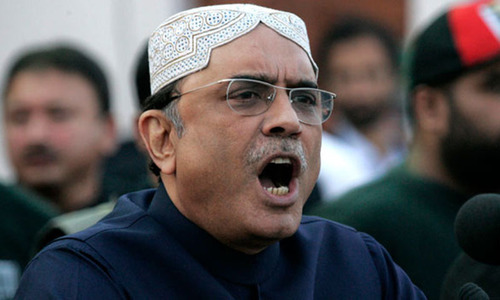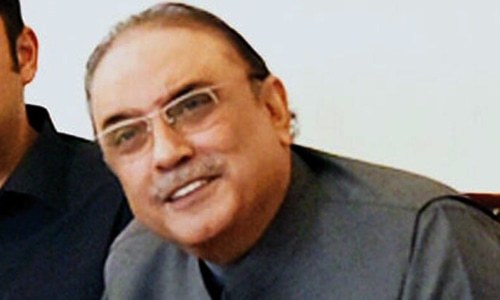
By all accounts, former president Asif Ali Zardari is one of the shrewdest politicians of the country. That is why he has been working on a strategy to win Sindh for the Pakistan Peoples Party (PPP) for some time now. But all the wisdom and tact in the world does not seem to be enough — at least for now.
The PPP formed the government in 2008 following Benazir Bhutto’s assassination in December 2007. Since then, the party has completed two successive five-year constitutional terms as masters in the province.
Moving the pieces
Zardari acted swiftly and with precision as he welcomed former foes in the party again. Influential politicians from the Pakistan Muslim League-Nawaz (PML-N), PML-Functional (PML-F) and Pakistan Tehreek-i-Insaf (PTI) have found themselves in the red, black and green of the PPP.
Take a look: 'Was Zardari so naive that he got duped by me?': Nawaz responds to PPP leader's criticism
The Arbabs of Tharparkar have been divided, and influential politicians of the province — ex-members of provincial assemblies — Imtiaz Shaikh of Shikarpur, Jam Madad Ali Khan from Sanghar and Mohammad Ali Shah Jamote of Matiari have all said goodbye to the PML-F. Ismail Rahu — a PML-N loyalist until recently — has also joined the PPP, and so have members of the Mahars in Ghotki.
The PPP will have to pull its socks up as it faces unprecedented difficulties. The charisma of the Bhuttos seems to have started fading away in Sindh. The generation of voters that has not seen Zulfikar Ali Bhutto, or his daughter Benazir Bhutto, is beginning to ask questions.
Jami Chandio, a political analyst.
The most surprising, even for PPP workers, is the re-induction of Thatta’s Shirazis — who had left the PPP at the last minute before the 2013 polls. Hala’s Makhdooms have also decided to stay with the party amidst rumours that they would be jumping ship. However, it seems all is still not well between the Makhdooms and the PPP. Makhdoom Jamiluzzaman, who is the spiritual head of Sarwari Jamaat, and his son Makhdoom Mahboob Zaman (both poll candidates) were conspicuous by their absence on July 3 when Bilawal Bhutto-Zardari reached Hala, PPP’s birthplace, to lead the party’s election campaign.
Makhdoom Jamil has large spiritual following. His followers — Ghani Khoso in Tharparkar and Ali Murad Rajar in Umerkot — are contesting against the PPP. A few PPP leaders met him to seek his disciples’ support in Sanghar and Tando Allahyar constituencies but he refused, saying the PPP leadership should talk to him. Makhdoom Jamil had demanded seats in other districts for his nominees but in vain.
Despite Zardari’s ambitions and carefully crafted realpolitik, the PPP is set to have a tough time in Sindh come July. Apparently, the problem is that the party this time has to explain to its voters 10 years of arguably subpar governance in the province.
“The PPP will have to pull its socks up as it faces unprecedented difficulties. The charisma of the Bhuttos seems to have started fading away in Sindh. The generation of voters that has not seen Zulfikar Ali Bhutto, or his daughter Benazir Bhutto, is beginning to ask questions,” claims Jami Chandio, a political analyst.
The competition
The PPP is not only competing with its traditional opponents but with also its former allies/parliamentarians. In Sindh’s Ghotki district that borders Punjab, two Mahar brothers — Ali Gohar Khan Mahar and Ali Mohammad Khan Mahar — following a split in the family, are taking on the PPP.

Some former party members have been denied tickets as well. Jam Saifullah Dharejo, the irrigation minister in the party’s 2008 government, is going up against the third Mahar brother, Ali Nawaz Khan Mahar aka Raja Mahar, after Dharejo was denied the party ticket for a second time. Dharejo has now joined the Jamiat Ulema-i-Islam-Fazl. Even in Larkana, the home of the PPP, the party is poised to face the group led by Dr Safdar Abbasi, who is allied with the Grand Democratic Alliance (GDA) and the Pakistan Tehreek-i-Insaf.
In 2013, the PPP won 92 out of 168 seats in the Sindh provincial assembly. The voter turnout, according to the Election Commission of Pakistan, was about 52 per cent in 2013, a little higher than the 45pc in the 2008 polls. In the National Assembly, the PPP won 91 directly contested seats in 2008 to form a coalition government, but managed a humbling 36 in 2013.
“Social media has changed everything. The youth are scaring waderas with their cell phones. Sindh’s urban youth has broken free from the waderas and the pirs. The political landscape is changing,” explains an analyst.
“The PPP has a bumpy ride ahead of it in Dadu district where the rookie candidate Irfan Leghari is competing against seasoned politician Liaquat Ali Khan Jatoi of the PTI, and in Shikarpur where the PPP’s former MPA Agha Taimoor is set to take on Imtiaz Shaikh,” admits a central party leader.
Asif Zardari and his sister Faryal Talpur — who wields a considerable amount of authority in the party — have okayed Thatta’s Shirazis return despite serious reservations voiced by other senior leaders.
“The Shirazis — who had mistreated party workers in 2008 — have been accepted back into the party, which is surprising. We can’t even object to these decisions considering we must abide by party policy. With the Shirazis on board, the PPP was hoping to sweep seven seats in Thatta and Sujawal, but the PTI and the GDA spoilt all the fun. The novice, Arsalan Brohi, is competing on a PTI ticket and he’s not backing down despite all attempts,” concedes a senior PPP leader.
Ever since the veterans — and former PPP leaders — Dr Zulfikar and his wife, Dr Fehmida Mirza, staged a revolt in Badin, things have not been the same for the PPP in the district. The Mirzas, who have recently joined the GDA, have been able to make inroads into the PPP’s stronghold.
Like in Badin, the PPP must contend with another disgruntled ex-party member in Mirpurkhas. Syed Ali Nawaz Shah, a close confidante of Benazir Bhutto and her father, is running as an independent candidate against the PPP on national and provincial assembly seats. The PPP is not out of the woods in Thar either, as the PTI’s Shah Mehmood Qureshi squares off against its candidate, Noor Mohammad Shah Jillani.
Sindh’s PPP president Nisar Khuhro believes that the party’s strategy has not failed. “We tried to attack the anti-PPP vote, and increase our tally of seats but we never claimed we were going to have all our candidates elected unopposed. Barring Ghotki, where the Mahars are having second thoughts, we are comfortable in all other constituencies.”
Published in Dawn, July 5th, 2018














































